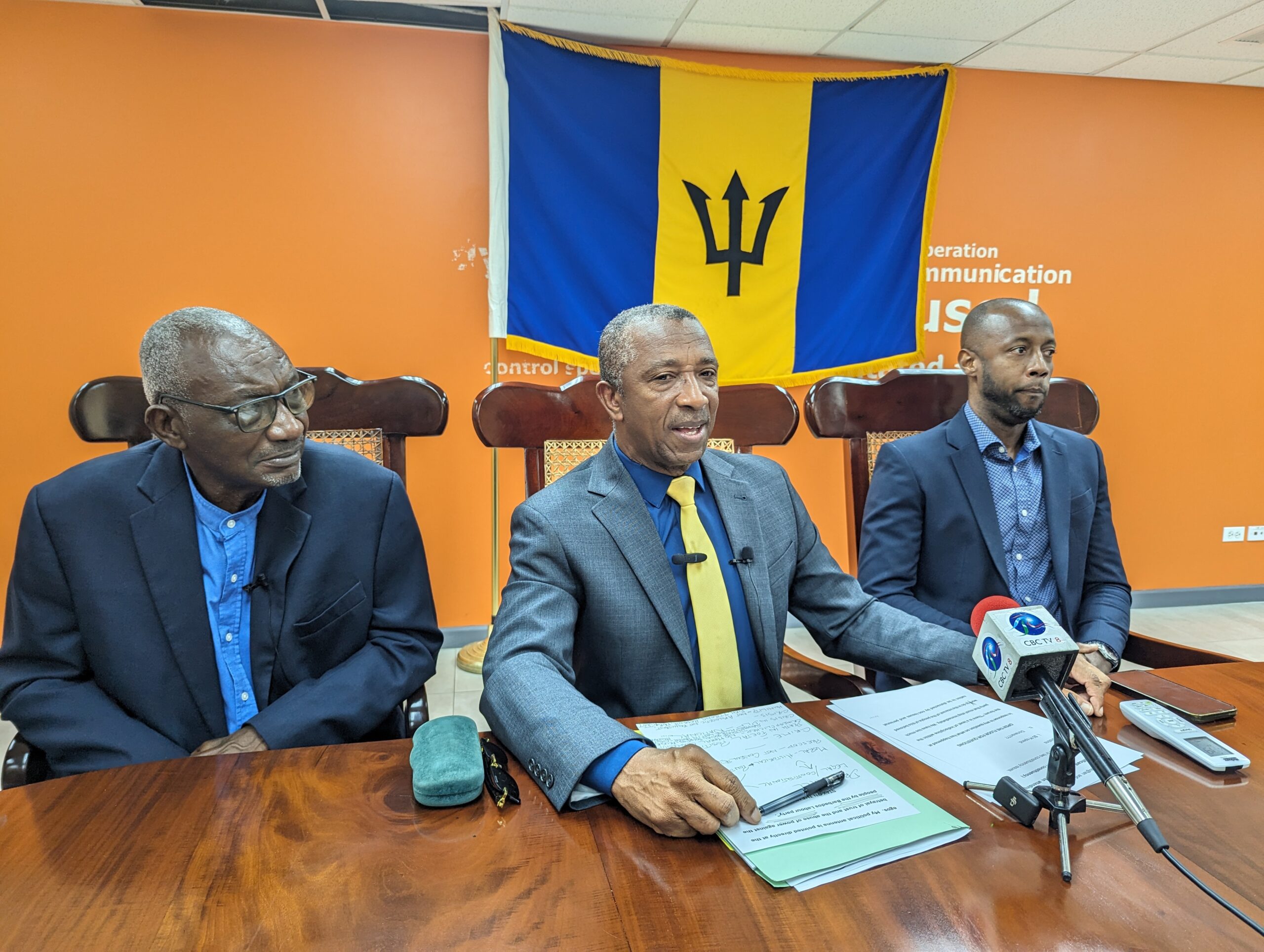Opposition Leader Ralph Thorne Launches Research Teams and Vows Unity Amid Internal Conflict in DLP

April 26, 2024
Opposition Leader Ralph Thorne transitions DLP shadow Cabinet to research and policy teams, aiming to address internal conflicts and provide a strong voice in opposition for public interest matters.
Opposition Leader Ralph Thorne on Thursday ended the practice of a shadow Cabinet in the Democratic Labour Party (DLP), unveiling instead “research and policy teams” that will be tasked to speak on matters of public interest, as he also assured a resolution to the 69-year-old political institution’s internal conflict.
Thorne as Leader of the Opposition in the House of Assembly and Senators Tricia Watson and Ryan Walters, the two members he handpicked for the Upper Chamber, will now chair the teams of spokespersons on public issues.
The shadow Cabinet had been created two months ago by DLP President Dr Ronnie Yearwood before Thorne crossed the floor and claimed the sole opposition seat in the House of Assembly.
In a call for unity within the DLP, Thorne vowed that party infighting would be resolved for the sake of the country, stressing that voters deserve a strong voice in opposition to the administration.
Speaking at his first official press conference at the new Office of the Opposition Leader in Hincks Street, Bridgetown, the Christ Church South MP, who was accompanied by Senator Walters, executive assistant Dr Derek Alleyne and party members, said the DLP’s crisis, which has seen no-confidence motions and counter-motions against him, Yearwood, General Secretary Steve Blackett and the party’s executive council, needed to be resolved immediately for the good of the nation.
Thorne told reporters: “The crisis in the DLP has become a national crisis, and it has become a national crisis because people care for the Democratic Labour Party. It has reflected itself as a national crisis because people have drifted away from the government, and people in Barbados want a representative against wrongdoing in government. Having betrayed the people of Barbados – the Barbados Labour Party government – they are turning to the Democratic Labour Party, and it, therefore, hurts them that this crisis has erupted. We feel that we must resolve it. We know that we must resolve it.”
He revealed that the party’s shadow Cabinet, unveiled by Yearwood in February, will be “reshaped” to help strengthen the voices of the party in the Lower and Upper Houses of Parliament.
Thorne explained: “We have three parliamentarians – one in the House of Assembly, and two in the Senate. I don’t necessarily believe in the concept of a shadow Cabinet; sometimes I think it is pompous, it is pretentious, and if we are going to be accusing the government as we still are of having a Cabinet that is too large, I don’t think it suits our purpose. Indeed, I think it is contrary for us . . . if there are 27 ministers, to take up 27 of our people and say ‘oh, you shadow this one and you shadow that one’.
“We propose to divide all areas of government between the three of us – myself and the two senators. Each of us will be a chairperson over those portfolios, and those portfolios will be extended to spokespersons across the party – candidates, potential candidates, persons of interest, supporters of the Democratic Labour Party, professionals, [and] specialists in the areas.”
He added: “We will not be focusing exclusively on academia; we are focusing on Barbadians of experience and a lot of knowledge. We will have research and policy teams under the supervision and chairmanship of Senator Walters, Senator Watson and myself. That is how we will approach the issue of opposing and exposing government.”
When pressed as to how he intends to encourage unity within his party, given a contentious meeting held on Sunday which saw Blackett publicly oppose him, Thorne responded that internal party rivalries are nothing new to the Barbadian public.
A week after veteran party member Hartley Reid filed a no-confidence motion against Yearwood, Blackett and the party’s entire executive council, Blackett announced his own no-confidence motion against the DLP’s political leader. He charged that after defecting from the Barbados Labour Party (BLP), Thorne “came into this party and from the get-go, associated himself with the dissident elements of this party, the people who were anti-leadership, who were anti-mainstream”.
Thorne said on Thursday: “You would have rivalries in the party, and there are rivalries in the Democratic Labour Party, there are rivalries in the Barbados Labour Party. There was never anything as traumatic as when a former prime minister of 14 years over this country stood up in the Parliament yard and accused the leader of his party [Mottley] of being a despot. What is going on now pales insignificantly with that event. They come and they go. It is our responsibility as members of the Democratic Labour Party to ensure that this crisis passes.”
He added: “I have a role as political leader of the Democratic Labour Party. My role is pivotal; but my style of leadership is one that embraces all of the energies within the party. I think I said it on Sunday night that we must not allow this crisis to cause ourselves to ignore the deeper crisis in Barbados. We know that we are hurting the freedom loving people of Barbados.”
“This is not about me, this is not about Senator Walters or Watson, this is not even about the Democratic Labour Party. This is about democracy in this country. It’s about the right of people to oppose the government, and we have that heavy responsibility. We are breaching that responsibility by allowing this crisis to reach the proportion that it has.”
During the news conference, Thorne also addressed a variety of other topics that he believed the Barbados public cared about and that he planned to concentrate on moving forward, including rising crime and the hotly contested Cybercrime Bill.
shamarblunt@barbadostoday.bb


